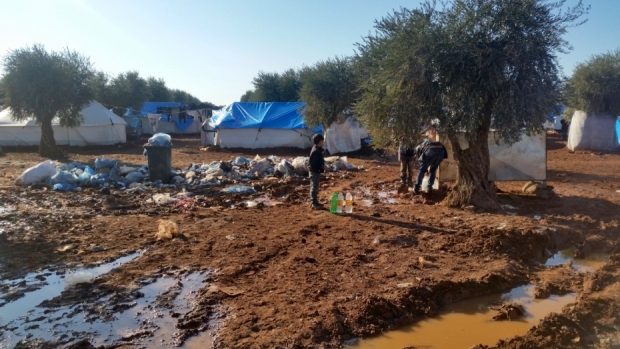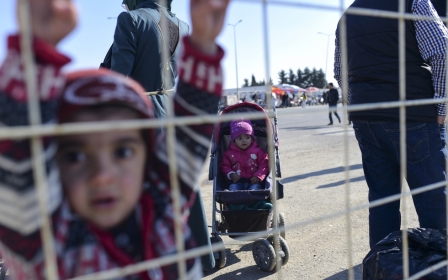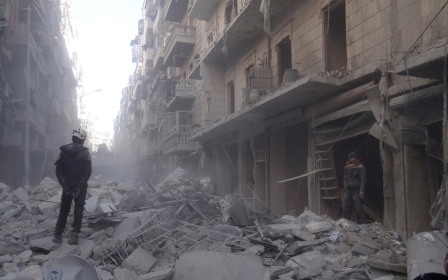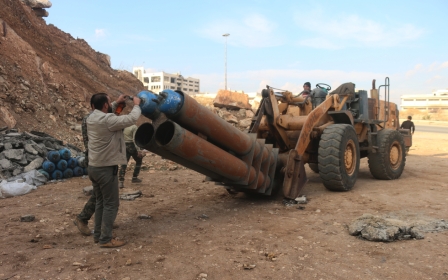'Hundreds killed' in battle for Aleppo as air strikes pound villages

More than 500 people, including dozens of civilians, have been killed since a major Russian-backed government offensive in Syria's Aleppo province began this month, a monitor said on Wednesday.
The UK-based Syrian Observatory for Human Rights, which relies on a network of sources on the ground in Syria for its figures, said the toll of 506 included 23 children killed in Russian air strikes on Aleppo city and its surroundings since the operation was launched on 1 February.
Observatory director Rami Abdel Rahman told the AFP news agency the figures included 89 civilians, 143 pro-government fighters and 274 rebel fighters and "foreign jihadists", including members of the Nusra Front, al-Qaeda's Syrian affiliate.
He said that 14 Iranian troops and at least three fighters from Lebanon's Hezbollah movement had died fighting alongside the forces of Syrian President Bashar al-Assad.
There were reports of more civilian casualties following Russian air strikes on Tuesday evening targeting the villages of Kafr Kalbin and Kafr Khashir in Aleppo's rebel-held Tel Rifaat district.
Local civil defence sources told Turkey's Anadolu news agency that 15 civilians had been killed and another 22 people injured in the attacks.
Earlier on Tuesday, Russian warplanes also targeted residential parts of Syria’s northwestern Idlib province, killing at least 15 civilians and injuring more than a dozen others.
Abu Mahmoud, a member of a local coordination committee in Tel Rifaat, said Russia had carried out more than 20 air strikes in the district and in neighbouring villages on Tuesday.
"Russia is trying to ethnically cleanse the region by striking opposition-held areas of northern Aleppo in an effort to force local residents to flee," he said.
Abu Mahmoud said that Russian air strikes were also providing cover for Kurdish PYD fighters to advance into formerly Syrian opposition-held villages, with clashes between Syria opposition forces and the PYD reported in Aleppo’s Menagh district and at the Menagh military airbase.
Fighting on Wednesday raged around Tamura, north of Aleppo city, the Observatory said.
Pro-government forces have made a series of gains this month in Aleppo province, severing rebel supply lines and prompting tens of thousands to flee towards the Turkish border.
The UN has warned that 300,000 people in eastern Aleppo city could be cut off from humanitarian aid if government forces encircle the area, a tactic used by the government to devastating effect against other former rebel bastions.
“If the GoS (government of Syria) and allies sever the last remaining flight route out of eastern Aleppo city it would leave up to 300,000 people, still residing in the city, cut off from humanitarian aid unless cross-line access could be negotiated,” the OCHA said on Tuesday.
The opposition has also helped to fuel the humanitarian crisis. According to the Observatory, the “judicial” authorities in Idlib province on Wednesday issued a statement, saying that any material, including food, that was smuggled into the Shia towns of al-Fuah and Kafriya would be executed. The two towns are loyal to the government and are under siege by Jaish al-Fatah an Islamists coalition that includes the al-Nusra Front.
The “judicial” authorities in Idlib province issued a statement, in which they showed that any material smuggling whether it was food or other stuff to the towns of Al-Fu’ah and Kafriya which are inhabited by Shiite citizens and besieged by the Islamic factions and Jabhat Al -Nusra (al-Qaeda in Levant) is strictly prohibited, and in the statement they said that whomever do otherwise will be “executed in public square” starting 3 days from the date of publishing the statement, they also said that this decision was made so that the siege of the fighters is not weakened, and the people of Al-Fu’ah and Kafriya won’t get any help, so they don’t endure and resist the siege of the “Mujahideen”, the thing which may weaken the position of “Mujahideen” who seek to “exploit the siege of Rawafid” in those villages to break the siege on the people who are trapped in Madaya and other besieged areas, to put pressure on “Nusayri criminal regime” and force them to lift the siege from “our people”.
Doctors Without Borders (MSF) warned on Wednesday that heavy fighting in the district of Azaz, north of Aleppo, was pushing the healthcare system close to collapse.
“Azaz district has seen some of the heaviest tolls of this brutal war, and yet again we are seeing healthcare under siege,” said Muskilda Zancada, MSF head of mission, Syria. “We are extremely concerned about the situation in the south of the district, where medical staff, fearing for their lives, have been forced to flee and hospitals have either been completely closed, or can only offer limited emergency services.”
MSF said that, since Saturday, Azaz had seen an increase of around 50 percent in its outpatient department, and was performing around 160 consultations a day - most for respiratory tract infections - and that aid camps were pushed to breaking point.
“The camps have no capacity to take in new arrivals,” said Zancada. “There is a risk that people, including young children and the elderly, could be stuck living in the open in freezing conditions, for several days at least. We expect that there could be severe health effects, and pneumonia is a big concern.”
Russia on Tuesday night submitted a new plan for Syria's future to the US, including President Bashar al-Assad remaining in power, the Russian Foreign Minister said on Tuesday night.
Sergei Lavrov said that, "without disclosing details," he had "suggested an absolutely concrete scheme in contacts with Washington," according to the Russian state TASS news agency.
He reportedly said he hoped that "the very simple proposals" will not take too long "for Washington to consider".
Lavrov said US proposals, which demand an immediate ceasefire, had consistently been blocked because US regional allies refused to accept terms unless Assad steps down first.
Russia has been criticised by European leaders including German Chancellor Angela Merkel and European Council President Donald Tusk for its bombing campaign in Syria, but a Kremlin spokesperson said there was "no credible evidence" that Russia had targeted civilians.
Meanwhile, Kurdish forces backed by Arab rebel groups captured a strategic air base and the adjacent town in northern Syria from rival anti-government factions overnight, a monitoring group said early on Thursday.
The Kurdish People's Protection Units (YPG) and its Arab allies expelled rebel fighters from the Minnigh air base and adjacent town, north of Syria's second city Aleppo, the Syrian Observatory for Human Rights told AFP.
The advance comes after days of fierce clashes that saw YPG forces advance east from the Kurdish stronghold of Afrin and take over a series of villages before reaching Minnigh.
"With the defeat at Minnigh, Islamist fighters lost the only military airport they held in Aleppo province," Observatory head Rami Abdel Rahman said.
"Minnigh airport lies between two key roads that lead from Aleppo city to Azaz" to the north, giving Kurdish fighters a strategic launching pad for offensives against jihadists further east, Abdel Rahman added.
Government forces lost control of the Minnigh airport in August 2013, two years after the uprising in Syria first erupted.
Rebel groups are facing a dual advance by both Kurdish forces coming from the west and regime troops - backed by a barrage of Russian air strikes - pressing an offensive north from Aleppo city.
Middle East Eye propose une couverture et une analyse indépendantes et incomparables du Moyen-Orient, de l’Afrique du Nord et d’autres régions du monde. Pour en savoir plus sur la reprise de ce contenu et les frais qui s’appliquent, veuillez remplir ce formulaire [en anglais]. Pour en savoir plus sur MEE, cliquez ici [en anglais].






